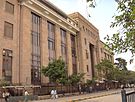- Derivatives market
-
Financial markets
Exchange
SecuritiesBond market Fixed income
Corporate bond
Government bond
Municipal bond
Bond valuation
High-yield debtStock market Stock
Preferred stock
Common stock
Registered share
Voting share
Stock exchangeDerivatives market Securitization
Hybrid security
Credit derivative
Futures exchangeOTC, non organized Foreign exchange Other markets Money market
Reinsurance market
Commodity market
Real estate marketPractical trading
Finance series
Banks and banking
Corporate finance
Personal finance
Public financeThe derivatives market is the financial market for derivatives, financial instruments like futures contracts or options, which are derived from other forms of assets.
The market can be divided into two, that for exchange-traded derivatives and that for over-the-counter derivatives. The legal nature of these products is very different as well as the way they are traded, though many market participants are active in both.
Contents
Futures markets
Futures exchanges, such as Euronext.liffe and the Chicago Mercantile Exchange, trade in standardized derivative contracts. These are options contracts and futures contracts on a whole range of underlying products. The members of the exchange hold positions in these contracts with the exchange, who acts as central counterparty. When one party goes long (buys a futures contract), another goes short (sells). When a new contract is introduced, the total position in the contract is zero. Therefore, the sum of all the long positions must be equal to the sum of all the short positions. In other words, risk is transferred from one party to another. The total notional amount of all the outstanding positions at the end of June 2004 stood at $53 trillion. (source: Bank for International Settlements (BIS): [1]). That figure grew to $81 trillion by the end of March 2008 (source: BIS [2])
Over-the-counter markets
Tailor-made derivatives not traded on a futures exchange are traded on over-the-counter markets, also known as the OTC market. These consist of investment banks who have traders who make markets in these derivatives, and clients such as hedge funds, commercial banks, government sponsored enterprises, etc. Products that are always traded over-the-counter are swaps, forward rate agreements, forward contracts, credit derivatives, etc. The total notional amount of all the outstanding positions at the end of June 2004 stood at $220 trillion. (source: BIS: [3]). By the end of 2007 this figure had risen to $596 trillion and in 2009 it stood at $615 trillion. (source: BIS: [4])
Netting
Global:
US: Figures below are from SECOND QUARTER, 2008 [5]
- Total derivatives (notional amount): $182.2 trillion (SECOND QUARTER, 2008)
- Interest rate contracts: $145.0 trillion (80%)
- Foreign exchange contracts: $18.2 trillion(10%)
- 2008 Second Quarter, banks reported trading revenues of $1.6 billion
- Total number of commercial banks holding derivatives: 975
According to Bank for International Settlements "$516 trillion at the end of June 2007"
Positions in the OTC derivatives market have increased at a rapid pace since the last triennial survey was undertaken in 2004. Notional amounts outstanding of such instruments totalled $516 trillion at the end of June 2007, 135% higher than the level recorded in the 2004 survey (Graph 4). This corresponds to an annualised compound rate of growth of 33%, which is higher than the approximatively 25% average annual rate of increase since positions in OTC derivatives were first surveyed by the BIS in 1995. Notional amounts outstanding provide useful information on the structure of the OTC derivatives market but should not be interpreted as a measure of the riskiness of these positions. Gross market values, which represent the cost of replacing all open contracts at the prevailing market prices, have increased by 74% since 2004, to $11 trillion at the end of June 2007. (page 28, http://www.bis.org/publ/qtrpdf/r_qt0712.pdf) [7]
Controversy about the financial crisis
The derivative markets have been accused lately for their alleged role in the financial crisis of 2007-2010. The leveraged operations are said to have generated an “irrational appeal” for risk taking, and the lack of clearing obligations also appeared as very damaging for the balance of the market. The G-20’s proposals for financial markets reform all stress these points, and suggest:
- higher capital standards
- stronger risk management
- international surveillance of financial firms' operations
- dynamic capital rules.
See also
- Commodity markets
- Securitization
- Financial engineering
Further reading
- Weinberg, Ari, "The Great Derivatives Smackdown", Forbes magazine, May 9, 2003.
- European Central Bank (Editor: Tom Kokkola), "The Payment System", Frankfurt am Main 2010, Chapter 3, ISBN 978-92-899-0632-6.
External links
- PBS (WGBH, Boston), "The Warning", Frontline TV public affairs program, October 20, 2009. "At the center of it all he finds Brooksley Born, who speaks for the first time on television about her failed campaign to regulate the secretive, multitrillion-dollar derivatives market whose crash helped trigger the financial collapse in the fall of 2008."
- History and Types of Derivatives markets 1MTX Glossary
Categories:- Derivatives (finance)
- Financial markets
- Total derivatives (notional amount): $182.2 trillion (SECOND QUARTER, 2008)
Wikimedia Foundation. 2010.

